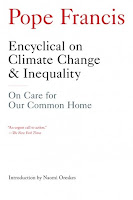“The legitimate object of government, is to do for a community of people, whatever they need to have done, but can not do, at all, or can not, so well do, for themselves---in their separate, and individual capacities.”--Abraham Lincoln

To blame population growth instead of extreme and selective consumerism on the part of some, is one way of refusing to face the issues. It is an attempt to legitimize the present model of distribution, where a minority believes that it has the right to consume in a way which can never be universalized, since the planet could not even contain the waste products of such consumption. Besides, we know that approximately a third of all food produced is discarded, and “whenever food is thrown out it is as if it were stolen from the table of the poor.”
(Location 587)
Inequity affects not only individuals but entire countries; it compels us to consider an ethics of international relations. A true “ecological debt” exists, particularly between the global north and south, connected to commercial imbalances with effects on the environment, and the disproportionate use of natural resources by certain countries over long periods of time.
(Location 594)
The warming caused by huge consumption on the part of some rich countries has repercussions on the poorest areas of the world, especially Africa, where a rise in temperature, together with drought, has proved devastating for farming.
(Location 600)
We must continue to be aware that, regarding climate change, there are differentiated responsibilities. As the United States bishops have said, greater attention must be given to “the needs of the poor, the weak and the vulnerable, in a debate often dominated by more powerful interests.”31 We need to strengthen the conviction that we are one single human family. There are no frontiers or barriers, political or social, behind which we can hide, still less is there room for the globalization of indifference.
(Location 614)
Hard to follow Ol' Abe and the Pope, but here are some other voices worth considering:
An important aspect of the neural symbols that make up our cognition is that they not only register emotion and sensation together, but also the volume of those signals. An intense emotion or sensation is more likely to get picked up by the limbic librarian than one that doesn’t stand out. Insofar as the Wedge requires a person to be attentive to their sensations and feelings, learning to play with the volume levels is another tool we can use to subtly alter the way we experience the world. As counterintuitive as it may seem, sometimes diminishing our senses is the key to connecting outward.
No decision you make will ever make it possible to avoid death. Which, in a strange way, means that the whole idea of risk is something of an illusion. If avoiding death was the goal, then we’ve already lost the game. But what if the point of being alive was instead to experience the entire bounty of human emotion, failure, triumphs, love and loss?
Whether humanity can move up to a transcultural identity in which science and a new kind of post-religious spirituality can reintroduce the fully individuated consciousness of the individual to a multidimensional cosmos is the question of our time.
Basically, when we approach life with our habitually passive attitude (James's “inferiority to our true selves”) we are saying to our robot, “Go ahead and take care of this, it isn't important enough for me to attend to,” and the result is that sense of separation from life, of never really touching it, that plagues so many of us in the modern world.
The problem with a purely material and rational society is captured by two well-known Biblical sayings: “Man shall not live by bread alone,” and “Where there is no vision, the people perish.”




























